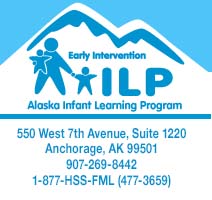
Transition at Age Three
Early Childhood (EC) Transition is the process that happens when young children with developmental delays or disabilities are moving from EI/ILP to a preschool program at age three. This usually means moving from a home-based program into a preschool.
In 1997, a collaborative effort between the Alaska Department of Education and Early Development (EED) and the Department of Health (DOH) formed the Alaska Transition Training Initiative (ATTI). This initiative was funded for 15 years to provide training and technical assistance focused on building sustainable teams of early childhood providers and special educators in Alaskan communities to support effective transitions for children and families.
The ATTI training team included parents and representatives from Infant Learning Programs, school districts, Head Start, preschool and child care. The ATTI team members provided training that helped local transition teams develop unique strategies for their communities. As a result, EC transitions improved significantly for many children and families. A number of excellent materials and tools have also been developed to assist parents and providers with successful navigation of the transition process. Many of these resources are now made available to you here.
Planning Resources for Parents
Parent Testimonials - Answers to questions and perspective on the transition process from a parent's viewpoint.
Planning Resources for Agencies
- Transition Basics
- Forms
- Miscellaneous
- Sample Flow Charts
Links to other websites:
- e-Learning Module on Transition - Alaska Department of Early Education and Development
You will need to register for access to the secure website where the following modules are located.
- An Introduction to Early Childhood Transition from Part C to Part B
Training Type: Online Course
Duration: 1 hour
Subscription Term: 90
Description:
Educators will learn to describe the Early Childhood Transition process from Part C to Part B as well as list the six key elements in transitioning. Educators will also be able to describe the following: how to prepare the child and the parents for transitioning, how to conduct the transition process, how to make a referral to the school district, how to implement the transition plan, and the implementation of the IEP and services.
- Early Childhood Outcomes
Training Type: Online Course
Duration: 1 hour
Subscription Term: 90
Description: Early Childhood Outcomes has a focus on function and data as a tool for program improvement. This course provides learners the opportunity to learn how to think functionally, monitor outcome data, use a variety of assessment tools, use the team process, and understand how and why to complete the Childhood Outcomes Summary Form.
- Stone Soup Group A non-profit agency providing support, information and referral to families of children with special needs.
Phone: 907-561-3701
- NECTAC - National Early Childhood Technical Assistance Center is a national technical assistance consortium working to support states to improve Part C services for young children with disabilities and their families.
- Transition One Stop -
The purpose of this site is to provide information related to the many transitions we encounter across our life spans. It is designed as a resource for anyone going through, or helping someone with, a life change including people with disabilities who may have additional needs during times of transition.
- Kentucky Early Childhood Transition Project (KECTP) provides training and technical assistance throughout the commonwealth to families and professionals interested in early childhood transition evidence based practice, emerging trends and changing legal requirements
